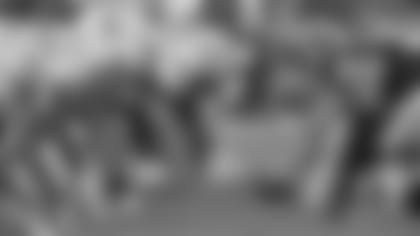ORLANDO, Fla. (March 19, 2002) - The "tuck rule" drew plenty of conversation at the NFL meetings.
In the end, however, there was no clear sense of what to do about it.
So instead of making a change, owners decided to table discussion about the controversial topic until their next meetings in May.
"You can't approach this thing in a knee-jerk fashion because of the effect it has on the game," said Tennessee Titans coach Jeff Fisher, co-chairman of the league's competition committee. "This has a big, big effect on the game."
The long-standing rule had not been discussed for years -- that is, until the New England Patriots' overtime victory against the Oakland Raiders in the divisional playoffs. Late in regulation, Patriots quarterback Tom Brady initially was ruled to have fumbled while being hit from behind. However, after a review by instant replay, Brady was ruled to have thrown an incomplete pass because his arm was going forward and he had not tucked the ball completely into his body.
The Patriots went onto to tie the game, force the extra period, and would proceed to win the Super Bowl.
For the past two days, club executives and coaches debated the issue of when the motion of the quarterback's arm still indicates that he intends to throw the ball, and at what point he was trying to tuck the ball away to run.
"As we discussed it, it didn't get clearer," said Tampa Bay Buccaneers general manager Rich McKay, the other co-chairman of the competition committee. "It got murkier."
By tabling discussion about changing the rule, all 32 teams will have time to study tapes of a variety of plays involving balls being knocked loose from quarterbacks.
No more votes will be taken during the session, which officially will conclude soon after the NFC coaches' annual media breakfast and other non-legislative activity on March 20.
Owners did approve some minor rules adjustments, including:
- Banning artificial noise -- such as blaring music over the public-address system -- in stadiums once the 25-second play clock has started for the visiting team. Previously, the ban began after the team had broken the huddle.
- Making chop blocks illegal on kickoff and punt returns as well as on plays from scrimmage.
- Not starting the clock on a kickoff until the receiving team touches the ball and begins to advance it. Previously, that rule only applied in the final two minutes. For the rest of the game, the clock started when the ball was kicked.
- Running the clock after a sack in the final two minutes of each half. During the rest of the game, the sub-two-minute rule will come into play, where the clock stops for about five seconds, then restarts.
- Adjusting the tiebreaker system so it conforms to the league's realignment into eight four-team divisions to accommodate the arrival of the Houston Texans. Now, common opponents is the third tiebreaker within a division after head-to-head games and division record because each of the four teams will have 14 common games in the 16-game schedule.









































